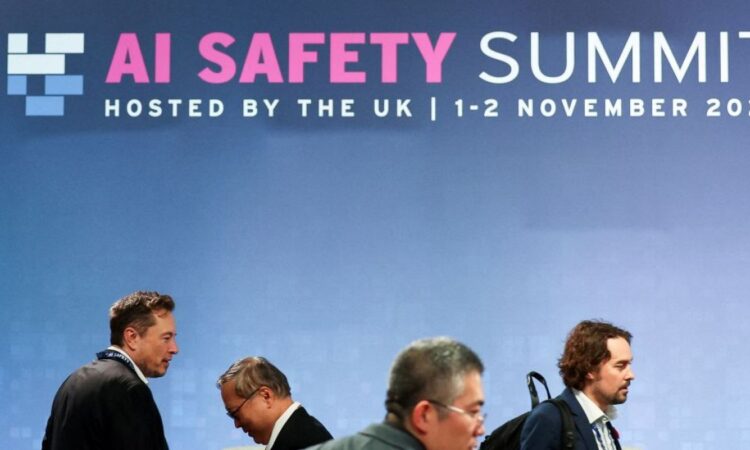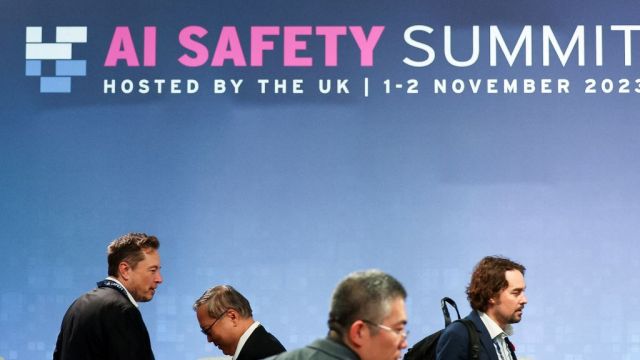

This is Science Fictions with Stuart Ritchie, a subscriber-only newsletter from i. If you’d like to get this direct to your inbox, every single week, you can sign up here.
It’s one of the biggest ever weeks for AI. Not only is the AI Safety Summit happening in Bletchley Park – the UK Government has invited effectively all of the top names in AI to come and discuss how we’ll control AI technology in future – but US President Joe Biden has issued an Executive Order on how the US will regulate AI advances in future.
This is all the result of many months (and for some, years) of worry over the potential dangers of AI. Although they’ve been building in complexity and capability for a long time, 2023 has really shown how advanced AI models have become.
Anyone who’s used a chatbot like Open AI’s ChatGPT or Anthropic’s Claude, or an image-generator like DALL-E, will have been blown away by their abilities (and if you haven’t tried using one yet, why on Earth not?!).
Think of it this way: for almost any task that a human brain can do, AI can likely do it quicker and more efficiently. Unfortunately, the human brain can do a whole lot of bad things: lying and deceiving; coercively controlling other people; being biased against certain groups; making weapons. AI models are already making these things much easier. In the medium term, the increased efficiency of the models will put many human jobs at risk. In the longer term, things could get very dark indeed: I’ve previously written about the existential risks of AI.
A lot of people would argue that these negative sides of AI mean that the AI companies should just stop working on the models. Why develop something with potential for such terrible downsides?
Let’s take that question seriously, and look at a few possible answers to it. What are the upsides of developing advanced AI models?
Economic productivity
We hear it endlessly: we’re in a productivity slump. The UK economy isn’t growing anywhere near as fast as we’d like, and various politicians’ schemes over the years have failed to accelerate it. Could AI be the step-change we need?
More and more companies are already using AI to boost their productivity: tasks like diary management, transcribing meetings, summarising documents, and even translating between different languages are all suddenly much easier and can largely be handed off to AI systems, freeing up human workers to do something more creative.
AI is useful for higher-level tasks, too: patterns in datasets – for example, where and when different products are being sold – that might never have been noticed by human observers can be picked up on by AI models, allowing companies to improve their advertising and increase sales.
Governments will also be able to use AI to make their policies more efficient, looking across datasets gathered from different parts of their country and different institutions to improve services. In the UK, AI might be able to help link up the notoriously scattershot NHS services and prevent experiences like that described by the BBC’s Rory Cellan-Jones this week, who said there was “hopelessly inadequate” communication between NHS staff in different hospitals and even different departments.
Those are just a few ideas. But just as computers, email, and the internet have allowed us to become much more efficient than the days of telegrams and fax machines (and allowed entirely new kinds of business to exist that didn’t exist before), it’s easy to see how AI, used appropriately, could make a major contribution to the economy, and shake us out of our long-term stagnation.
Science
Scientists have already been using some of the components of AI, like deep learning, for many years to improve their research and get more out of their datasets. But some recent advances really push the envelope. For example, just this week Google DeepMind announced some exciting new advances from their AlphaFold model, which is trying to discover the structure of proteins as well as other molecules.
Knowing the structure of molecules is one of the great open questions of biology, and it’s super-important: if you know the exact structure of a molecule then you can design a drug that “fits” it, like a key to a lock. That means your drug could have a much more powerful effect on whatever that protein does – and thus on whatever disease it’s involved in. One example is for diseases like Covid: using these AI tools could help us design antibodies that neutralise the effects of the virus and don’t stop working the moment a new variant evolves.
More broadly, in many cases scientists have an awful lot of data and not enough brainpower to analyse it. That’s no insult to the scientists: no human could ever hope to fully understand how the human genome works, or what’s going on in our brains as we carry out complex tasks.
And that’s where AI comes in. The pattern-sensing ability of AI models can be applied to huge scientific datasets, and, so long as those data are detailed enough, could give us entirely unexpected insights into all kinds of important biological and chemical processes. We could suddenly find ourselves making progress with diseases like dementia and some forms of cancer, where science has generally been stuck in a rut.
Crime-fighting
Yes, there’s a major potential for AI to cause fraud, identity theft, and other kinds of financial crime. Criminals are already salivating at the opportunities that AI models could afford them, if it’s possible to “jailbreak” them from the ethics that the manufacturers build into them. For fraud, we’ll likely see an arms race between AI-for-bad and AI-for-good, just like we’ve seen over the past couple of decades with spam versus spam filters.
But AI could also be used to fight other kinds of crime. It’s already the case that systems like the Police National Computer have revolutionised how the justice system uses data. I recently read about the terribly bungled Yorkshire Ripper inquiry in the 1970s and 80s, where the police had interviewed the perpetrator nine times and had his information stored on several index cards across their creaking database, but never linked the information together (he was eventually caught by accident).
A disaster like that would be extremely unlikely to happen nowadays, with computer technology. But AI will take it a step further: being able to work out even more detailed patterns of offending will help prevent crimes and catch more perpetrators. AI can be applied to forensics, too: we’ll be able to model aspects like gunshot trajectories and blood spatter to work out in much more detail how a crime occurred.
A massive part of crime-fighting is about spotting patterns. And as we’ve seen above, AI is already vastly better than humans at exactly this.
Entertainment
If like me you’re an enthusiastic Spotify user, you’ll have noticed that AI is starting to be employed in entertainment. Spotify’s new AI DJ does, at present, leave a lot to be desired (no, I don’t really want to hear a 16-minute classical music piece back to back with a 3-minute pop-rock song – that’s not how it works). But its algorithms have an almost uncanny accuracy in providing me with music I like that I’ve never heard before, and they’ve been getting better over time.
We also saw in Peter Jackson’s recent Get Back Beatles project that AI techniques can be used to enhance old film, going from drab and boring-looking visuals to gorgeous, colourful detail.
Not only can it help us enjoy things that already exist, but AI can be used to create entertainment. In future we’ll see videogames where the non-player characters can, through the use of chatbots that are set to the character’s specific personality, have long, detailed and unique conversations with each player.
Of course, one of the things that sparked the recent writer’s strike in Hollywood was the fear that AI might replace human writers for films and TV shows. And many authors and artists are up in arms about AI models being trained on data from their works without their being consulted or paid (in my view, a lot of this is what economists call “rent-seeking”, where people want to be paid for not actually providing any useful service).
As with any massive new technology, there’s going to be a lot of back and forth (only recently did the music industry really settle into the streaming model after years of warring over piracy – and there are still protests about how it works to this day). But it would be silly to claim that AI won’t have huge benefits for so many parts of the entertainment industry.
Look on the bright side
Don’t get me wrong: none of the benefits above mean that we should take our eye off the ball when it comes to AI safety. I’m very glad that we’re having the AI Safety Summit and that all the AI companies have been pushed to enact a variety of measures to ensure that their models remain under our control and aligned with human goals.
But amid all the doom and gloom, we should remember that the whole reason we’re developing these models in the first place: to improve the human condition. Despite the downsides, the sheer power of AI means we have a very good chance of doing just that.
Other stuff I’ve written this week

As a recent convert to lifting weights at the gym, I’ve been wondering about which of the many supplements, pills, and powders that are on the market might actually work in improving your performance. I took a look at the evidence for some of the most prominent ones.
Science link of the week
I found this a really sad article, about how Japanese research is slipping down the quality rankings over time. Is it to do with the ageing population and low levels of immigration in the country? Something else? Whatever it is, it’s a cautionary tale that other countries will want to avoid.
This is Science Fictions with Stuart Ritchie, a subscriber-only newsletter from i. If you’d like to get this direct to your inbox, every single week, you can sign up here.






